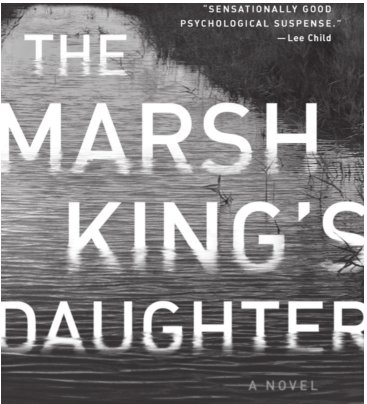It’s been over a year since Michigan author Karen Dionne hit the literary lottery and her book, “The Marsh King’s Daughter,” sold for $1.2 million.
Tuesday, her long awaited work will land on shelves at bookstores, in sweet spots at airport stores and Sam’s Club and even on Facebook.
The promotional run-up has been phenomenal, including a mega-blurb from thriller writer Lee Child, plugs in trend-setting magazines like Cosmopolitan and, just a few days ago, a spot in The New York Times’ summer reading edition of its book review, which called Dionne’s novel “subtle, brilliant and mature.”
Dionne, who spoke with City Pulse from her home in southeast Michigan, did not conceal her excitement about finding success after years toiling in the second tier of paperback originals.
“Excuse me if I speak in exclamation marks,” she said. “I have a permanent smile.”
Dionne has a long catalog of thrillers, which often feature catastrophic environmental events or tinges of the supernatural. But her new book takes place on a much more human level and explores a father-daughter relationship that is both disturbing and loving.
The daughter in the novel, Helena, is the offspring of a teenage mother and her kidnapper, who has hidden them in the woods of Michigan’s Upper Peninsula for more than a dozen years. Dionne tells the story in chapters that alternate between a contemporary storyline and flashbacks detailing the captivity, Helena’s escape and the ultimate imprisonment of her father.
Some 15 years after escaping captivity, Helena has created a life of her own, running a successful natural food business while raising two children with a loving husband who knows nothing of her past. Then her father makes a brutal escape from prison, and Helena knows he will come after her. To survive, the hunted must become the huntress.
Helena knows her father will take to the backwoods of the Upper Peninsula, still her home and an environment he is intimately familiar with. We learn from the flashback chapters that Helena, who learned at her father’s knee, might be the only one who has the skills to track and capture him again.
She often learned those skills in cruel ways during her 12 years of captivity.
What often makes the book really sing is the authenticity Dionne brings in writing about the northern woods of Michigan. The author and her husband were part of the back-to-nature movement that arose in the 1960s. In early 1974, the couple bought 10 acres in the Upper Peninsula just off M-28 near Seney. The idea was to live off the land and sell her husband’s pottery. They lived in a hand-hewn cabin for more than 30 years before moving below the bridge.
“The first year we lived in a tent with no running water and no electricity,” she said. “I write what I know. Everything comes from the knowledge I have lived.”
The buzz for “The Marsh King’s Daughter” is not just limited to the United States. The novel will be published in 21 countries, ranging from Brazil to Romania to Taiwan. Dionne believes that the father-daughter relationship will transcend regional differences.
“Helena loves her father, and she loves the marsh,” Dionne said.
Helena’s love-hate relationship plays out through the novel, including a scene where her testimony puts her father in prison for life. That conflict comes to a head when Helena becomes a bounty hunter to save her own life and protect her family’s safety.
Readers who are familiar with Emma Donoghue’s “Room,” or the subsequent movie, might wonder if Dionne was riffing off that kidnapper-captive-offspring plot. Dionne said she wasn’t aware of the similarity until she was well into writing “The Marsh King’s Daughter.”
“I deliberately stayed away from reading it,” she said. “I didn’t set out to write the reverse ‘Room.’” In fact, she remembers the exact moment when her book took shape.
“I woke up in the middle of the night with fully developed sentences,” she said.
Anyone familiar with the works of Hans Christian Andersen will know the title was cribbed from his odd fairytale of the same name and roughly familiar plot.
Dionne’s experience writing thrillers is clear in the way she builds tension as the daughter who can get into the mind of her father begins tracking his movements. On the other side, he knows exactly how she will react and is waiting for her around every turn.
The book’s climaxes —yes, there are more than one — will keep you guessing until the chaotic end.
Support City Pulse - Donate Today!
Comments
No comments on this item Please log in to comment by clicking here